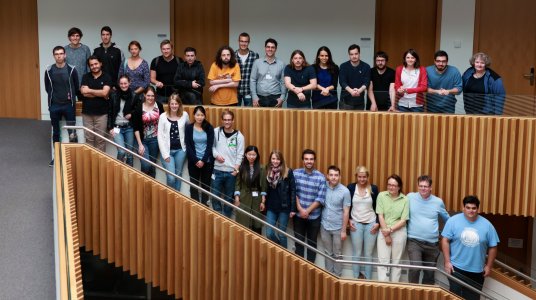European Summer School in Modelling, Analysis and Simulation Crime and Image Processing
In this summer school we focus on the mathematical topics of crime and image processing which currently attract a lot of attention both from mathematical research and from real-world applications, but where these two sides are rarely taught together.
The summer school will combine a traditional research school that introduces the participants to mathematical topics, theory and techniques of current interest with a typical modelling week, where the participants will apply these techniques to specific real-world problems. These problems will be investigated by the participants in small teams during several days of hands-on group work.
Two types of techniques will be taught for each topic, one based on partial differential equations (PDEs) and the other on a discrete approach such as networks. These techniques involve data modelling and processing, which are rapidly growing in their importance for industrial and applied mathematics. The real-world problems will be chosen to allow for the application and combination of both types of techniques.
The intention is to provide the participants with a working knowledge of multiple approaches and an understanding of how they can be combined to address complex modelling problems in multiple application areas.
Due to the intensive group supervision requirement in the project phase, the research school is limited to about 30 participants, which are split into groups with 5-6 members for each case study project. The lectures and practicals are held entirely as single session events so that the participants are exposed to all application areas and techniques.
Sponsors
| The European Mathematical Society |
| The Mathematical Institute, University of Oxford |


Lecturers and lecture titles
- Andrea Bertozzi (Department of Mathematics, UCLA, USA): Mathematics of Crime
- Mason Porter, Roxana Feier and Lucas Jeub (Mathematical Institute, University of Oxford, UK): Topics in Network Science
- Gabriel Peyré and Clarice Poon (CEREMADE, Université Paris-Dauphine, France): Wavelets and sparse regularization of inverse problems in imaging
- Carola Schönlieb and Matthias Ehrhardt (DAMTP, University of Cambridge, UK): Variational methods for inverse imaging problems in biomedicine and remote sensing
Time and place
The school will be held between July 4th - July 8th, 2016, at the Mathematical Institute in Oxford (UK). Arrival is on Sunday, departure on Friday afternoon. The programme will begin with lectures and practicals on Monday and Tuesday, followed by group work on the case study projects from Wednesday to Friday morning. The school ends on Friday early afternoon with presentations by each group reporting on the outcome of their investigations.
Travel to and from Oxford:
Oxford is well connected to public transport (train and bus coaches) and there are frequent bus coaches in particular to London Heathrow and Gatwick. The web page of the Mathematical Institute provides detailed travel information.
Important visa advice for Non-EU citizens: Please be advised that if a visa is required for the purpose of your visit to Oxford it is your responsibility to ensure the correct visa is obtained for the nature of your visit and a scanned copy must be sent to the department in advance of your arrival.
Registration fee
Participant are asked for a registration fee of 150 GBP which covers coffee and lunch meals, the academic programme, and, for non-local residents, accommodation Sun-Fri (5 nights) including breakfasts, and the social dinner. Participants are expected to cater for their needs on the other evenings, and cover their travel expenses.
Organizers
Andreas Münch, Jared Tanner (Mathematical Institute, University of Oxford)
Gitta Kutyniok, Barbara Wagner (Institute of Mathematics, Technical University Berlin).
Application
All PhD students and early career researchers with an interest in the topics and techniques of this workshop can apply from all countries. The school is aimed at PhD students and postdocs, but advanced undergraduates are also welcome. We are keen to involve students with a diverse background. However, a core knowledge of differential equations and experience with MATLAB are desirable.
Please send applications to essamoxf2016 [AT] maths.ox.ac.uk with
- your full contact information: name, affiliation, address, email, phone
- a brief CV with your academic background (education and positions)
- a short description of your scientific interest in this research school and your motivation
- a list of publications (if any)
in this order in a single attached pdf file (not in the body of the email).
(Extended) Application period ends 02 May 2016. We plan to notify all applicants as soon as possible after this date. Applications arriving after the deadline will be considered if places are available.


